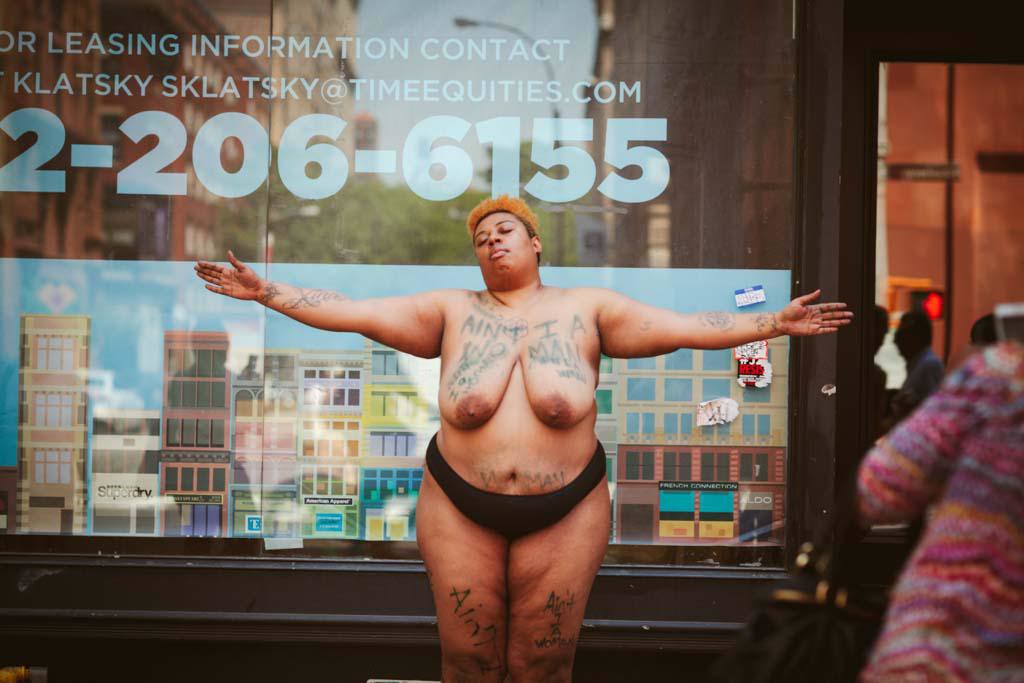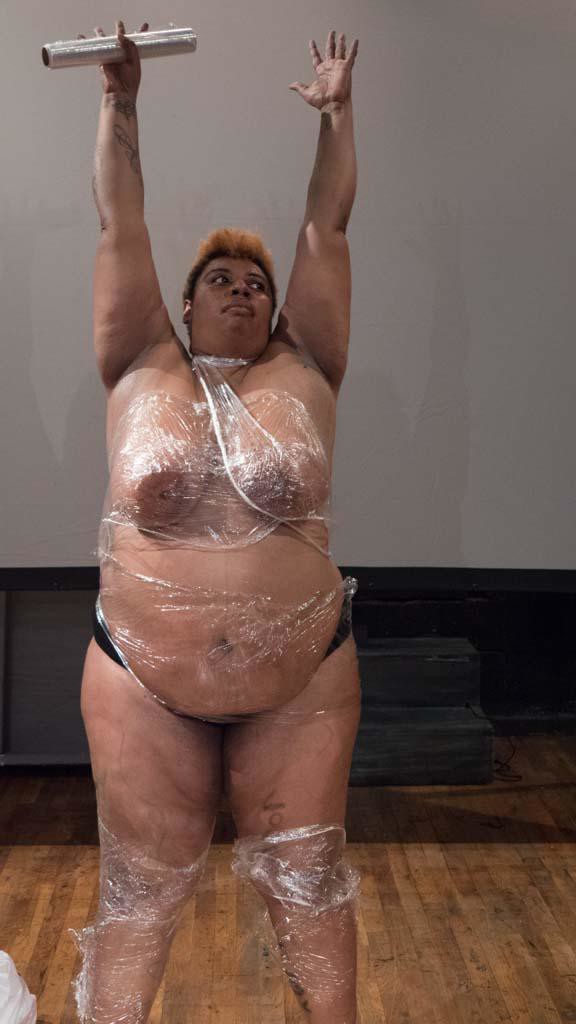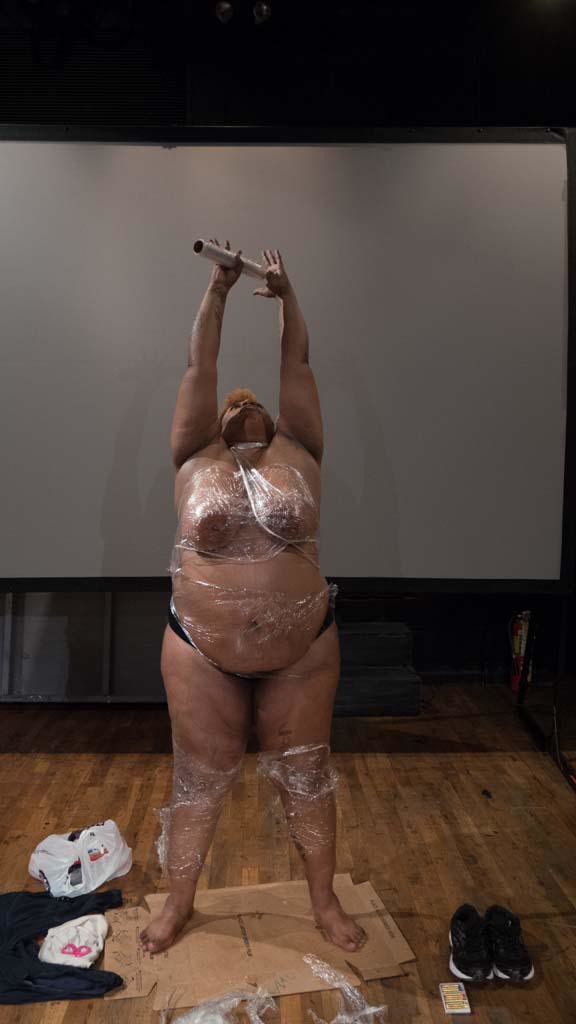Below is an essay by artist Nicole Goodwin, a fellow in the Hemispheric Institute’s 2017 EMERGENYC program, on her piece “Ain’t I a Woman?” presented on May 18th as a “public action” on a sidewalk in Greenwich Village. Goodwin, which shares its title with an 1851 speech by African-American abolitionist Sojourner Truth, created this piece to represent “…the alienation that I experience as a black woman and mother daily.” New York University’s Hemispheric Institute of Performance and Politics has been training emerging artists whose work is a vehicle for social and political activism since 2008; more information on the artists, works, and ideas behind this year’s public action can be found here.

It’s a little past 1 am on Friday May 19th and I have finally fully awakened from my evening nap. My body is fresh and clean now for the most part because I have showered washing away the marker “tattoos” inscribed “Ain’t I a Woman” written all over my body. I miss them, because they were the only indication I have now that Thursday May 18th truly happened. When I applied to the Hemispheric Institute 2017 EMERGENYC fellow, it was because I wanted to “push the envelope” as an artist. No one really tells you that the envelope can push back on you as a person. I told my daughter what I did today, how I went topless with the words “Ain’t I a Woman” inked all over me. She was quiet and I asked why. All she could say was that she wanted to hurt someone because they said her art was terrible and didn’t give a reason why. “I know how you feel is all that I could say.”
And like that I am back on streets of Washington Place. Back half nude under the sun. Back in my black, topless body. For the first time in my life I am doing this. Performing without verbs or nouns, or sentences. I have been topless before, but that was back when I was in the Army stationed in Germany. That was back 14 years ago before I had put on weight. Before I saw myself as an artist with something to say. It never occurred to me that I would be topless in public on the streets of New York City. Nor did it ever occur to me that on that day I would be secretly praying that people would respect my “No photos” policy. Some do, quietly going their own away. But there were others. Others that showed me no respect.
“Tip her!” I heard from far away, or it seemed loud enough for me to hear it from afar. I was so confused. I kept going with all I had because that was all I could do. More people stared. They shuffled along the sidewalk staring. “Pay her!” I wanted to respond, to scream out “I am not a prostitute!” I change my pose towards the voice. “Pay her,” the white woman said, “Pay her for her ART!” I think I was shocked more than anyone.
Linus is going wild somewhere down the block and I am horrified. He isn’t the man I have come to know in the last few weeks, no now he’s embodied some coked-out, white-collar specter whose whiteness terrifies me. I continue to pose waiting for him to invade not just my space, but my body and devour my soul. I think of all my nameless ancestors, who experienced the same thing. I think of Sarah Bartmann, also known as Venus Hottentot, and how her body was owned. The more pictures taken of me the more I wonder is today’s world any different than the one she was forced to survive in? I think of Kara Walker and her pieces that appeared years ago during the last days of the Domino Sugar Factory. I lie on my elbows and knees with my ass up like as sphinx with “Ain’t I a Woman” appearing across my back. There I catch a glimpse of Patches and their red dress standing some distance away; with caution, they are watching.
Lucas is across the street covered in purple blood, being hurled at them with balloons. They are lying on the ground pounding the concrete with their palms as the balloons pummel them, drenching them in purple goo from head to toe. I tear up and want to comfort them but I can’t break character. I force all of the anguish down into my belly and I silently continue to pose.
A black lady shouts to me. “You got guts!” Her phone is out and she films me. She smiles. I find my lips creasing into a smile. And yet I am angry. I still don’t want my picture taken but the more David said no, the more the crowd pushed back. The more the crowd pushed back, the more I felt like a failure. You got guts, you are brave. I hear the women shout this. Either black or white they are shouting this. But I am neither of these things. I am a hypocrite. I am afraid. I wonder if I have put art before being a good mother and caring for my daughter.
I take a small water break. George, one of the Hemispheric Institute facilitators, comes up to me. We talk for a bit. “Don’t worry about the cops,” he says. “The NYU security guards know what’s going on and they don’t care.” We both laugh. He tells me about the lady who said I had guts. She didn’t think much of my performance at first. “It’s the end of the world,” she said. George being the protector that he is kindly defends me and my work. “Don’t say that, she’s one of my students.”
“Why would she do something like that?”
“Well, WHY do you think she needed to?”
The black woman pauses for a bit to think on me and the work. Why would an overweight black woman stand topless, with the words “Ain’t I a Woman” inscribed all over her body? Why? They talk more discussing my ideas behind the spectacle. Finally, she says to George “I can tell you one thing she has guts.” I smile as George recounts the whole story and some parts of me are restored making me feel whole again. I begin to pose again.
There are moments when the heat seems to be getting to me; moments where I am completely in my body and moments where I am completely gone—lost within the ritual of stretching and posing, then repositioning again as time passes. I can see people surrounding me, phones out ready to take pictures even though David is kindly asking them not to. Charivel comes over, more pedestrians come some attempting to photograph me from across the street. Charivel sees this, stands in front of me to shield me. I continue the routine as if she isn’t there, yet I am grateful she is. I feel protected even more so now and I am relieved that David is getting help. I also feel ashamed. I hate how afraid I am. Even though, it is my first time doing a public action I should have known better. I keep repeating this over and over in my head.
“I bet if you give her $20 she’d let me take her picture!” The crackhead woman said loudly after Clarivel made her walkaway. I caught a glimpse of them over and over as her and her man sneaked picture after picture, each time the flash going off on her phone. David tried so hard to usher people into just looking and NOT taking pictures. How hard is it for people to just be in the moment? I kept thinking to myself. I found myself looking at the crowd it became harder and harder to just stay in the safe place. The void. I cried a little.
Faces begin to blur with time. Only voices now. Voices and sounds. Flashes of light. The feeling of not wanting things that are happening to happen. The heat is getting to me. I stop and drink water. I have become more comfortable being topless and less comfortable with getting my picture taken by pedestrians. Both continue happening. I thought about Arantxa. I thought about how only an hour or so before I saw her across the street, her silver reflective sheets blowing in the wind. There was something beautiful in that quiet stillness surrounding her, those slow movements of hers. I wanted to embody that somehow. I switch my poses every second my muscles tense, or twitch or sting. I summon up David again in my head, watching the ritual of taking the black slip off over and over becoming accustomed to the same temporal movements, trying to project strength and courage like they did. Trying to cast out the fear.

I keep wanting to live in the moment. I want that for people as much as I want that for myself. I can see some of them—those walking away obliging us, and others protesting as if I have become something of theirs. Something of use to them, not a human being, not a woman, but an object. An old, tall white man in a blue and white striped polo shirt yells at Clarivel “It’s my right to take pictures, she’s in public who do you think you are Donald Trump?” I retreat into my body, into the void somewhere in the lower part of my spine, the small hole where my nerves crawl into. On the most painful days, especially when it’s cold I feel I’d go insane from the pain. But on this day, it is a place of strength. I find that place along the spine and root myself there ignoring the instinct to give in.
“Please don’t take pictures out of respect for the artist,” Clarivel says to a light skin black woman with short dark hair. “Respeck? What I hafta respeck about dat? If she wanted respeck she shouldn’t have come out like dat!” The woman’s words sting my heart. I began doubting myself. But something inside me pushes, it pushes me hard and I continue until David says “Its 12:44. Do you want to stop?”
I nod yes, exhausted but satisfied and happy.
I am still constructing and deconstructing this experience. Trying to find the holes and pores where all the sweat, blood and tears fall in. Leaving the door open hoping to discover the self that I am, and uncover the self that I want to be, despite what society thinks about black women and our bodies and programs others to behave towards us. I often wonder what it is like to be brave. I stopped believing in the word after my return from the war. But now I am starting to see it as not a word that is remotely the opposite of fear—but the act of forging onward in spite and may be even because of it.
Something inside of me wanted to prove that I was worthy of love as a woman, worthy of respect as an artist. No not just a woman or an artist, as a black woman and a black artist. And most of all, and of this I am certain, something inside of me wanted to face the fear of losing my child again. Of having to live with the idea that a year ago I had to fight for custody for her, to prove I was sane and that I could be a mother again. That ordeal scarred me so deeply, I felt like any move I made would be the wrong one. That at any moment my daughter would be removed again. No matter if I was in the right I would lose the most important person in my life for the third time.

Living with that fear made me feel traumatized, alienated, dehumanized. As if I was some creature who could never be forgiven her mistakes, that I was some animal for having a diagnosed mental illness. I felt that fear for three more days. In the shower is where I had the vision of the words “Ain’t I a Woman” written all over my body. From somewhere deep inside this word bubbled and boiled until it exploded before me like a hot spring. By removing my child and keeping her away from home for a year, Administration for Children Services not only stabbed at my life as a mother, it also nearly destroyed my identity as a woman. I wanted to have a sense of the pride I had in both of those aspects in my life back. In my piece “Ain’t I a Woman?” wasn’t a just a question or a retort, it was a battle cry.
Having done the piece now I can say something inside me has awakened. I can envision the possibilities now of creation, like how the universe is constantly expanding and contracting. I can feel the glory within my own existence. I can summon up the courage to rage against the dying light. My body isn’t a vessel used for frivolous pleasures anymore. Now I see it as a great tool that chips away at the walls of master’s house.
Nicole Goodwin is the author of Warcries, as well as the 2017 EMERGENYC Hemispheric Institute Fellow, the 2013-2014 Queer Art Mentorship Queer Art Literary Fellow, as well as the winner of The Fresh Fruit Festival’s 2013 Award for Performance Poetry. She published the articles “Talking with My Daughter…” and “Why is this Happening in Your Life…” (Personal essay/Review for award-winning documentary Tough Love) in the New York Times’ parentblog Motherlode. Additionally, her work “Desert Flowers” was shortlisted and selected for performance by the Women Playwriting International Conference in Cape Town, South Africa.

